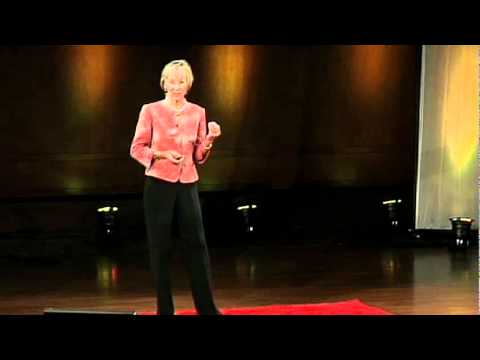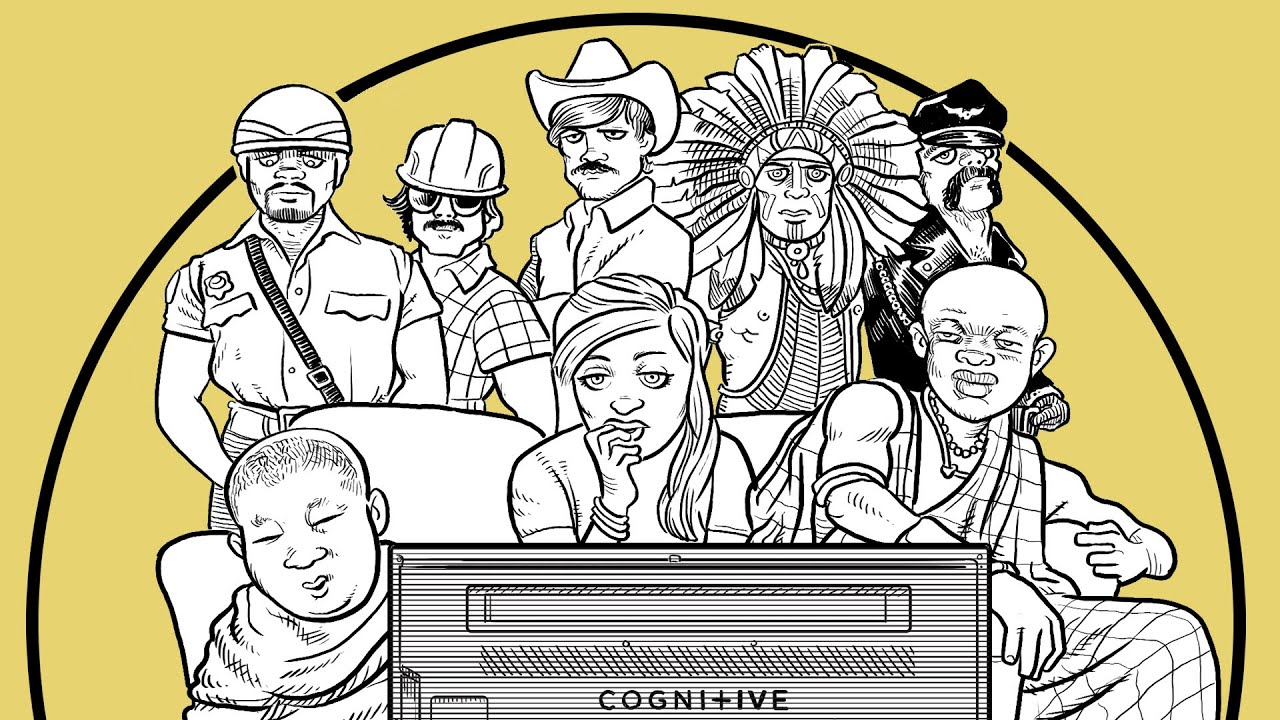http://www.ted.com At TEDxRainier, Patricia Kuhl shares astonishing findings about how babies learn one language over another — by listening to the humans around them and “taking statistics” on the sounds they need to know. Clever lab experiments (and brain scans) show how 6-month-old babies use sophisticated reasoning to understand their world.
TED
Source
The linguistic genius of babies | Patricia Kuhl




Firstly, well done on learning lots of languages… but can you please give the people credit for teaching you where its due. You would not be able to learn any language at all without hearing it spoken by other people – they are your teachers. It is a complete impossibility to learn a language without being in the presence of another person or communicating organism.
I think the bit where dushevka claims that anyone who hasn't learned more than one language "doesn't give a shit" qualifies him/her to "sound like a dick" to some people. Apart from being a wholly inaccurate and assumptive statement about English and Chinese people, it is unnecessarily rude which immediately weakens the strength of the argument for people often resort to insults when they are at the limits of their knowledge.
I have to write about this lecture for a class but I don't know if I am supposed to discuss the Rolex..
I hate it when you can hear the (disgusting) sound from the speaker's mouth not the sound of language but all the other!
nothing to do with the video's subject… but g****mn, it's "to you and ME," for chrissake!
This is what frustrates me. There's legitimate evidence that learning other languages at younger ages can benefit children, but in the United States (the majority of it, anyway), they wait until early adolescence to teach children new languages.
For example, when I was five years old, I attended a school on Martha's Vineyard, as I was born there and lived on-island until the age of seven. They taught the students how to speak beginners Spanish throughout their entire educational career. I remember the stuff we learned back then.
I then moved to Rehoboth, Massachusetts and found that they no longer taught a foreign language to my age group (I moved at the age of eight going into nine). I went for around three years (until the age of thirteen, I believe, when we were entering 7th grade) without trying to learn another language.
Upon entering that Spanish I class, I found that I remembered the small amount of Spanish that I was taught as a younger child, but struggled like all hell when we were being taught in middle school and onward (so much to the point where I gave up in my senior year of high school, and now suffer the consequences).
I am now 21, and trying to learn the German language as I didn't finish all four years of a foreign language in high school. I am having a ridiculously difficult time trying to grasp the concepts of grammar in another language, despite it being fairly similar to my own native tongue.
Point being, I am really sick and tired of school systems doing teaching styles improperly. With all this scientific evidence to back it up, would it not make more sense to teach kids how to speak foreign languages at a much earlier age, as the plasticity of the brain would be more apt to hold onto the information? It's ridiculous, because they then expect students to fluidly absorb this new language information.
Some students can easily grasp language comprehension (I have a few friends who might as well be native speakers), but they don't think to teach them earlier on when it's more beneficial to the student rather than themselves. It's idiotic.
She said: look at your age on the horizontal access done and you'll see on the vertical your skill in acquiring a second language the babies and children are genius says until they turn 7 and then there's a systematic decline after puberty will fall off the map no scientist dispute this curve for laboratories all over the world!
This is blatantly false! Many experts dispute this claim. Note that she does not give references for where this chart comes from (most likely it is an interpretation of Johnson & Newport, 1989, which is a flawed study carried out by two researchers with insufficient experience and understanding of foreign language acquisition.
This is extremely irresponsible on her part to spread this myth. Children stop reacting to sound differences that do not affect meaning in their language. This is true. But it does not mean that there is a critical period after which we cannot learn to distinguish such sounds.
The views given here show clear monolingual bias. The same bias and ignorance seen in the writings of Chomsky and Pinker.
Personally I have learned over 20 languages as an adult and the pronunciation and accent is mostly a matter of choice (willingness to develop an new additional cultural/linguistic identity). We can train ourselves to recognise and produce the sounds of any language at any age.
i love it when she says babies are the citizen of the world.
Good explanation of the plasticity of the brain that allows for language acquisition, and covers in detail the first year of life. Just an aside, I've always thought that globes and maps should use the written and spoken language of the country they depict. If this talk has had an update, do message me. I'd love to see it.
"No experts dispute this." Bullshit! Many linguists dispute this including the renowned linguist Stephen Krashen.
If that graph was accurate in the beginning, then I would have been able to speak French after taking it for 4 1/2 years from grade school to middle school. Guess what? I couldn't back then, and I still can't now. This video is spreading misinformation. I learned Korean in college for less than 2 years now and can speak it at an intermediate level. My Korean is not perfect, but it is far better than I could ever speak French. And guess what? English is my native language. So how is it that my Korean is several times better than my French?
For anyone who uses the excuse that babies learn language better, it's just what it is, an excuse. I was able to learn Korean because I was motivated and determined to learn it. Unfortunately when I was in school, despite all of those hours in the classroom, I was not determined to speak French fluently. Babies learn their parents language for the sake of survival. They want to communicate with their parents, right? How else will they be able to do so effectively without learning the language?
2 things about this video.
1.) A lot of mentioned things like the developement of the childrens "pronunciation capability" are very true and are shown in a lot of cases.
2.) Nevertheless, I does not mean that they have more difficulties with learning new sounds when they are grown up. I grew up monolingual (well ok English as a second language with 7 or 8, but anyway) now I speak 4 languages and learning my 5th while I started them jsut about 2 years ago. I think it really depends on things like motivation, intelligence and perseverance. Because if you know abstract words, you can directly ask and try to translate them to a close counterpart in another language.
And the best part was that rolex ad…
Mediocre.
Im and early years student and I found this video very interesting and would recommend it for other students in terms of studying SLA or child development modules
Some people are commenting that they learned a language later in life… that is not the point of the presentation. Dr. Kuhl discusses how babies under 8 months of age from different cultures can detect sounds in any language from around the world, but adults cannot do this. Adults are language bound listeners and listen in a different way than babies do. Adults consciously use their brain to memorize and learn, while these infants are just gathering sound recognition by nature. TO oversimplify, its the difference between studying to learn French vs hanging out in a room with French people and knowing French.
The Abstract for her research makes this more clear:
"Patterns of developmental change in phonetic perception are critical to theory development. Many previous studies document a decline in nonnative phonetic perception between 6 and 12 months of age. However, much less experimental attention has been paid to developmental change in native-language phonetic perception over the same time period. We hypothesized that language experience in the first year facilitates native-language phonetic performance between 6 and 12 months of age. We tested 6–8- and 10–12-month-old infants in the United States and Japan to examine native and nonnative patterns of developmental change using the American English /r-l/ contrast. The goals of the experiment were to: (a) determine whether facilitation characterizes native-language phonetic change between 6 and 12 months of age, (b) examine the decline previously observed for nonnative contrasts and (c) test directional asymmetries for consonants. The results show a significant increase in performance for the native-language contrast in the first year, a decline in nonnative perception over the same time period, and indicate directional asymmetries that are constant across age and culture. We argue that neural commitment to native-language phonetic properties explains the pattern of developmental change in the first year."
I wonder about this.
The audio result mean sound.
And anotherone the video result mean sound + video or sound only?
I like men
Extremely interesting! I wish she publish a book/audiobook wrapping up all her discoveries, and teaching parents how to help their children develop optimally.
Thank you so much P.Kuhl & TED.This brilliant video finally explains why, no matter how slowly and how carefully enunciated, my German friends tried to demonstrate the difference in German between 'ln' and 'len', I was unable to actually HEAR a difference (as a native English speaker, learning German,aged 17). My English speaking mother probably didn't use the word 'kiln' over much in her Motherese! Thanks Mom! You could have saved me a lot of sweat and tears…! It also explains why my native German wife , when she was at school, struggled to HEAR the difference, in English class, between 'fought' and 'thought' .
I found something interesting and useful from the video. Thanks for your publishment.
Can anybody tell me where I can get the references from? I need them.
"Se necesita un ser humano para que los bebés saquen estadísticas."
Who watched the Rolex advert to the end?
Wir should alles apprendre uno new language avec emotions und intéraction social, then
Koro speakers are Tibetans. Their homeland is part of Tibet, not India; Indians stole it.
Too many contributing factors and too few experiments to single them out. Both video or audio can be effective if you present the thing which that word stands for together with the sound. Yes Teddy bear alone won't do, neither is audio alone; I bet humans alone will not do either if there is no visual aid involved. The is Pavlov's second signal system at work. I am shock that there is no mention of Pavlov in this typical Pavlovian scenario.
What a sad state of affairs of the American intellectual scene.
i love you mr. chomsky
Ok
babies need human voices not meg machine ones and we can clearly see from he babies face, poor thing, that she is a bit shocked and puzzled with the sound, not at all liking it. This must make a bit of tension in them as her expression clearly shows it. Of course we know human voice is so important to babies, vital for their healthy growth but machine voices is a whole lot of crap. Human beings rising, nature rising stop all the bullshits
Good job !
that sound coming from her mouth is extremely annoying. i can't even watch the video without losing concentration. 0:19
SOOOOOOOOOOOOOO FUCKING IRRITATING!!!!
i always wonder what happens if nobody speaks around a baby until he/she is 7. what happens then?
As a amateur linguist, this video is very interesting.
The terms being used are so ridiculous "citizens of the world" "geniuses", etc. These are not scientific, accurate, or appropriate. Babies are not "taking statistics" when they are listening. How ignorant does this presenter think the audience really is? Also, Mandarin is not the language taught in Taiwan, or did I miss something about the babies learning a second language?
her mouth is so slimey i cant even listen to this
This crowd is like a comic statistics taking babies
yo! if you most verily lovingly would check the new tune and <3 or repost if you vibe with!
https://soundcloud.com/israel-lg-aguilar/ja-clarity-gray-coot-v11bruferrbeatztypebeat
https://soundcloud.com/israel-lg-aguilar/ja-clarity-surreal-edifice
Tf was this is my dream and how
simple
body has to learn it
first step in learning a foreign language as an adult is to be able to copy the sounds with proper intonation, as children do
ta-dah
then comes the rest
If youre interested in more of what Dr. Khul is talking about : https://www.ncbi.nlm.nih.gov/pmc/articles/PMC2947444/
She needs to research the statistics on getting that spit out of her fucking mouth so it doesn’t sound like oral sec when she’s talking
I don't agree with language accusation based on age @1:20 I believe that the drop has to do with once awareness and attention span have you spoken to a baby and he/she gives you the outmost undevided attention. I believe this drop as you become more aware of yourself and basically crowed up your brain with other stuff that room for acquiring new language dissipates.
8:05 Ah… this must be what that new Jason Statham movie, "The Meg", is about.
Does a baby distinguish one language from another? To the baby I would think sounds are just sounds.
How amazing is I´m taking a teaching course and that we had homework watching videos like this one and at the same time I have a baby boy who turns tomorrow 8 months old.
Amazing stuff
Keep this thing to be well taken care of by Allah.
Rick Beato brought me here.